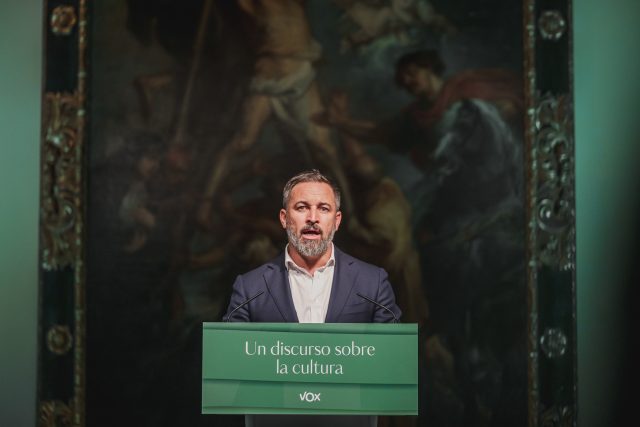
Culture has become one of the most heated battlegrounds in the Spanish political landscape. During Prime Minister Pedro Sánchez’s time in power, the so-called “culture wars” reached new heights. The Socialist Party deals with separatist forces and the ultra-woke parties have polarized the Spanish society. Spain is now at a crossroads between the politically correct vision of the left and the right’s struggle to preserve traditional values.
With the General Election just around the corner, political parties have felt compelled to propose “Culture Programmes” that outline the policies they plan to enact, should they enter a coalition government. So far, two parties have presented their plans for the cultural industry, EPP’s Popular Party (PP) and ECR’s Vox.
The president of Vox, Santiago Abascal, released his this week. He chose the headquarters of the Carlos Amberes Foundation in the center of Madrid as the venue for his presentation. The seventeenth-century architecture, with its vaulted ceilings and majestic columns, served as a more than ideal backdrop to celebrate traditional values in an otherwise ultra-modern political campaign.
Abascal took to the stage in front of Peter Paul Ruben’s The Martyrdom of Saint Andrew. The three-meter-tall painting depicts the crucifixion of Christ’s apostle. This image holds great significance for Spaniards. The “X” shaped Cross of Saint Andrew was emblazoned on the flag of the former Spanish Empire. That symbol spread Spanish culture and values in the largest civilizing enterprise in history. The Americas became forever bonded with our continent because of the unbreakable and enduring ties only culture can provide. That legacy, however, is now under attack.
The president of Vox referred to this and other affronts in his speech. He echoed the timeless lines of the cinema classic Life of Brian. “You can’t have babies // Don’t you oppress me”. Today, that classic scene between “Loretta” (formerly, Stan) and the rest of “the People’s Front of Judea”, would be the subject of woke censorship. To Abascal, “the Monty Pythons, the novels of Agatha Christie, the tales of Roald Dahl, Harry Potter, and so many authors and titles” are “suffering”. Vox has pledged to fight cancel culture in its program.
He went on to review the legacy of Spain’s history. “Spain is its culture, its art, its literature”. The country has an unparalleled diversity of traits, traditions, and customs. They have defined Spain for decades. Despite these differences, all Spaniards share a language and an overall Western tradition.
Abascal also proposed having a Ministry of Culture. “Not a Deputy Minister, not a Director General”, but a ministerial-level figure. He added, “we will not continue, nor do we respect de current hijacking of our culture by a false elite that intends to redesign society according to its own tastes and interests”. Vox agreed to aid the cultural industry with direct financing and tax relief “to foster the enormous talent of this country”.
Santiago Abascal’s vision for the cultural industry serves one fundamental purpose: to keep Spain together. Amidst the several attempts to break Spain, our culture and history are the best tools in our arsenal to maintain the territorial integrity and coexistence between our different peoples.
Our culture is a legacy of traditional Judeo-Christian values, the Roman codes of law, and the democracy of Ancient Greece. The culture of Spain is the culture of the West. Our explorers, kings, queens, and statesmen have made immense contributions to this civilization. The notion of human rights was first spoused in the proclamations of Queen Isabel de Castilla, where she swore to protect Native Americans and forbid their enslavement.
We ought to protect that legacy, not just for Spain, but for the Western world. As a member of ECR, Vox accepts that responsibility gladly and without reservations. It is now the Spaniards’ turn to decide their cultural destiny.



 Subscribe
Subscribe